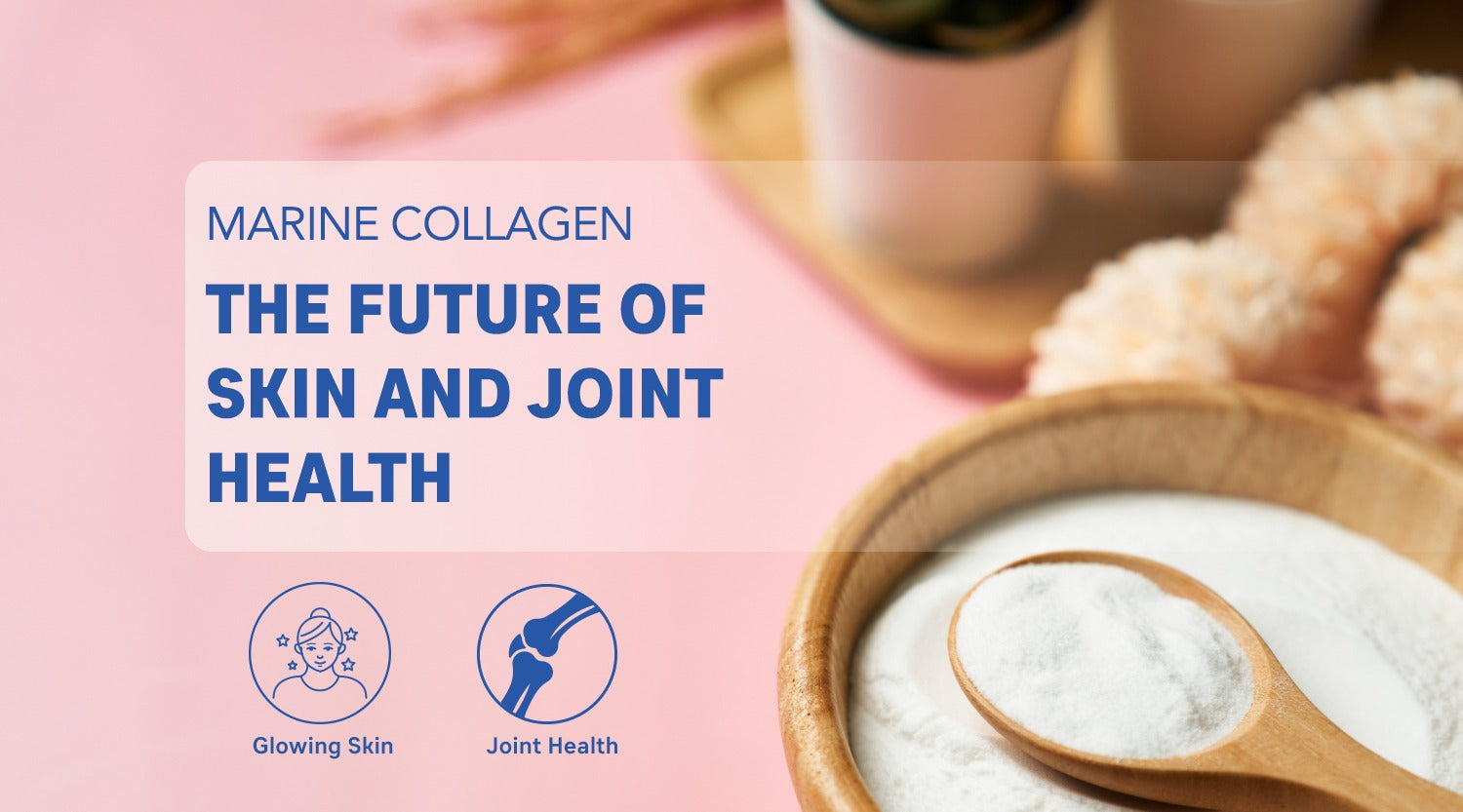
Marine Collagen: The Future of Skin and Joint Health
Understanding Marine Collagen: Sources and Benefits
The Origins of Marine Collagen
In recent years, the health and wellness industry has witnessed a surge in the popularity of collagen supplements. Marine collagen stands out due to its unique properties and health benefits. Collagen, a protein found abundantly in our bodies, plays a critical role in maintaining skin elasticity, joint health, and overall well-being. Marine collagen, sourced from marine environments, offers a high-quality, sustainable alternative to traditional collagen sources.
Importance of Marine Collagen for Skin and Joint Health
Marine collagen, a bioactive protein found in marine species, has been widely studied for its possible use in the pharmaceutical and cosmetic sectors. Marine collagen is water-soluble, metabolically compatible, and easily accessible, making it a versatile chemical capable of mending skin damage and slowing down human aging. It has been demonstrated to promote keratinocyte and fibroblast migration, vascularization, and the prevention of osteoporosis and osteoarthritis. It also combats other bone-related disorders by boosting bone mineral density, mineral deposition, and osteoblast maturation and proliferation. This article focuses on the benefits of marine collagen and its medicinal applications in bone and skin damage.
Marine Collagen
Marine collagen is a premium supplement derived from fish. Unlike traditional collagen sources, which are often bovine or porcine, collagen products are sourced from fish scales and skin. This not only ensures a higher absorption rate but also caters to those who prefer not to consume land animal products. The process of extracting collagen from marine sources is meticulous, ensuring that the end product is of the highest purity and quality.
Health Benefits
- Skin Health
One of the most celebrated benefits of marine collagen is its positive impact on skin health. Collagen plays a vital role in maintaining skin elasticity and hydration. Our body's natural collagen production decreases as we age, leading to signs of aging such as wrinkles and dry skin. Supplementing with marine collagen can help replenish these diminishing collagen levels and promote healthier, more youthful-looking skin.
- Joint Health
Collagen is also crucial for joint health. It helps maintain the integrity of cartilage, the rubber-like tissue that protects the joints. Regular intake of marine collagen can reduce joint pain and symptoms of arthritis. It can also help prevent bone loss, making it an essential supplement for individuals with osteoporosis or those at risk of developing it.
- Other Benefits
Marine Collagen also offers other health benefits, such as promoting hair and nail growth, aiding in weight management, and improving gut health. Its high protein content makes it an excellent supplement for muscle repair and recovery, especially for athletes and fitness enthusiasts.

Uses
Marine collagen is typically available in powder form, making it easy to incorporate into your daily diet. It can be mixed into beverages like coffee, tea, or smoothies or even added to food. It's odorless and tasteless, ensuring it doesn't alter the taste of your favorite foods or drinks.
Emerging Trends in Collagen Supplements
Marine collagen supplements are gaining popularity due to sustainability and ethical sourcing trends. Derived from fish scales, skin, and bones, marine collagen offers unique advantages over traditional sources. Its bioavailability makes it an attractive option for skin, hair, and joint health. As research advances, personalized formulations are emerging. Marine collagen is also being integrated into skincare products and functional foods, promoting a complete approach to health and beauty. The digital era has facilitated information sharing, allowing consumers to make informed choices about marine collagen supplements. With the evolution of consumer preferences and scientific advancements, marine collagen supplements remain at the forefront of the health and wellness landscape.
How to consume the collagen
Collagen, the most abundant protein in the body, is essential for maintaining skin elasticity and joint health. Consuming collagen can be achieved through supplements, which can be mixed into your morning coffee, smoothie, or favorite beverage. Collagen-rich foods like bone broth, chicken skin, or fish with edible bones also provide essential nutrients for overall health. Prioritizing consistency in consumption can maximize results. Incorporating collagen into your daily routine can lead to healthier, more radiant skin and stronger joints. Both supplements and whole foods can be beneficial for overall health.
Contraindications:
- Allergies: Individuals with known allergies to fish or shellfish should avoid marine collagen supplements, as they are derived from marine sources.
- Medical Conditions: People with certain medical conditions, such as kidney problems or hypercalcemia, should consult with a healthcare professional before taking collagen supplements.
- Pregnancy and Breastfeeding: While collagen is generally considered safe for most people, pregnant and breastfeeding women should consult with their healthcare provider before adding any new supplements to their regimen.
- Medication Interactions: Collagen supplements may interact with certain medications, such as blood thinners. If you're taking any medications, consult with your healthcare provider before starting collagen supplementation.
Marine collagen represents a significant step forward in dietary supplements. Its benefits for skin, joint health, and overall well-being, combined with its sustainable and ethical sourcing, make it a top choice for health-conscious individuals. Whether you're looking to improve your skin's appearance, reduce joint pain, or enhance your overall health, Marine collagen is a supplement worth considering. As with any dietary supplement, it's always best to consult a healthcare professional before starting any new regimen.
References
1. Geahchan S, Baharlouei P, Rahman A. Marine Collagen: A Promising Biomaterial for Wound Healing, Skin Anti-Aging, and Bone Regeneration. Mar Drugs. 2022 Jan 10;20(1):61. doi: 10.3390/md20010061. PMID: 35049916; PMCID: PMC8780088.
https://www.mdpi.com/1660-3397/20/1/61
2. Coppola, Daniela, et al. "Marine collagen from alternative and sustainable sources: Extraction, processing and applications." Marine drugs4 (2020): 214.
https://www.mdpi.com/1660-3397/18/4/214
3. Lim, Ye-Seon, et al. "Marine collagen as a promising biomaterial for biomedical applications." Marine drugs8 (2019): 467.
https://www.mdpi.com/1660-3397/17/8/467
4. Salvatore, Luca, et al. "Marine collagen and its derivatives: Versatile and sustainable bio-resources for healthcare." Materials Science and Engineering: C113 (2020): 110963.
https://www.sciencedirect.com/science/article/pii/S0928493119346892
5. Felician, Fatuma Felix, et al. "Collagen from marine biological sources and medical applications." Chemistry & biodiversity5 (2018): e1700557.
https://onlinelibrary.wiley.com/doi/abs/10.1002/cbdv.201700557
